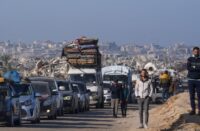Parks Canada has temporarily halted the second stage of a contentious initiative aimed at eradicating invasive deer species from a small Gulf Island near Victoria. This decision was announced on Wednesday, following the release of a video that captured distressed and fatigued deer trapped in the project’s netting.
The agency had set up approximately 35 km of netting on Sidney Island in August with the intention of corralling the deer for extermination by marksmen. However, the welfare of the island’s animals and the netting’s inefficiency in herding them, which reduced the likelihood of a successful outcome, led to the decision to postpone the actions until 2024, according to a statement from Parks Canada.
The agency said the pause would allow for further consultations with First Nations and project partners to devise an alternative solution for restoring the ecosystem. The program to eradicate the deer has been mired in controversy since its inception. Parks Canada argues that the program is vital to eliminate hundreds of European fallow deer, which were brought to the island in the mid-20th century and have wreaked havoc on the indigenous ecosystem.
Despite the controversy, the project has received backing from the W̱SÁNEĆ Leadership Council and several local First Nations. In early 2023, the island’s residents narrowly voted in favor of Parks Canada’s plan to eliminate the deer population. However, the decision has faced staunch opposition locally.
Some island dwellers claim they have successfully controlled the deer population through private hunting. Others have raised concerns over human safety and animal welfare. The Canadian Taxpayers Federation has also critiqued the program’s multi-million-dollar budget, stating that approximately $10,000 has been spent per deer killed so far.
In December of last year, project marksmen killed 84 deer. The hunters, Parks Canada, and First Nations collectively recovered around 800 kilograms of meat, hides, and other usable materials, which were subsequently distributed among the W̱SÁNEĆ communities.





